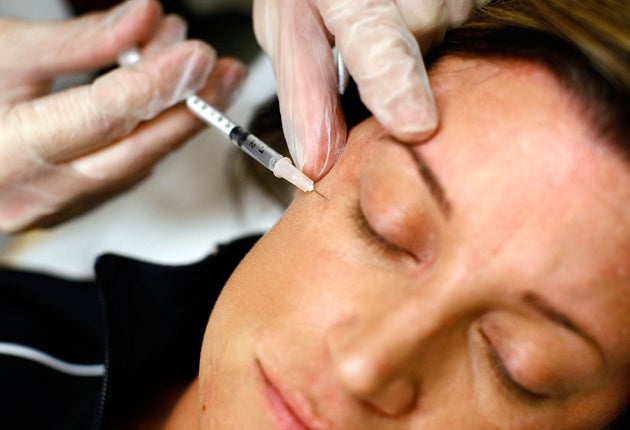Cosmetic surgeons won't be able to guarantee beauty under new guidelines

Surgeons will be banned from telling patients they will look better after cosmetic surgery under new proposals.
The Royal College of Surgeons (RCS) has produced a new code of practice that will stop surgeons telling patients they will look like particular celebrities after treatment.
Surgeons will be told to avoid words such as 'nicer' and 'better' and to opt instead for words such as 'smaller' when talking about procedures with patients.
At-home cosmetic procedure parties should be also banned, surgeons advise.
So-called "Botox parties" or "filler parties" - where groups of friends gather to receive the treatments at home - are "wholly incompatible" with professional standards, the RCS said.
Treatments should only be carried out on licensed premises with resuscitation equipment readily available in the event of an emergency, according to the new RCS guidance.
Many companies offer "at home" cosmetic treatments, with special discounts for the event host.
But the RCS said such parties are "entirely at odds" with the standards set out in its new Professional Standards for Cosmetic Practice.
The standards also state popular cosmetic treatments can be delivered by people with no medical qualifications.
Procedures including laser treatment and injectable anti-wrinkle treatments can be administered by people who have no healthcare training whatsoever.
The RCS recommends that only doctors, dentists or nurses who have undergone the appropriate training should be allowed to perform the treatments.
And only qualified medical doctors should be allowed to carry out invasive procedures such as breast surgery or liposuction.
They also suggest that time-limited discounts on cosmetic surgery should be banned to prevent people from impulsively buying procedures.
There should be a "cooling off period" of at least two weeks between the initial consultation and the procedure, the guidance adds.
Cosmetic surgeons and other people who administer treatments should consider whether patients need to be referred to a clinical psychologist before going ahead with the procedure, the guidance also recommends.
RCS president Professor Norman Williams said: "While the Colleges and professional organisations involved in cosmetic practice are neither regulators nor legislators, the profession has a responsibility to provide standards to which we would expect our members to work.
"We have serious concerns that not all those who offer cosmetic procedures are adequately qualified, or that patients are getting accurate information prior to treatment.
"We hope these standards will feed into the ongoing review of the industry led by the NHS Medical Director, Sir Bruce Keogh, and improve quality of care for patients going forward."
Steve Cannon, chairman of the working party which developed the guidance, added: "As the majority of cosmetic procedures are not available on the NHS, we must ensure that commercial interests do not compromise patient safety.
"With the demand for cosmetic surgery and non-surgical treatments rising year on year, it is crucial that the highest level of professionalism is maintained amongst practitioners."
The British Association of Aesthetic Plastic Surgeons said the new guidance was a "step in the right direction" but called for more stringent recommendations on cosmetic surgery advertising.
Baaps president Rajiv Grover said: "The marketing and advertising of cosmetic procedures is neither educating nor informing, but an exercise squarely aimed at achieving sales. This clearly puts economics ahead of patient care.
"Although the RCS report suggests tighter control of marketing in this area with a ban on such strategies as time-limited offers, again at the Baaps we feel there is a need to go even further - the only way to fully protect the public is to have an outright ban on advertising, as seen in some European countries and which is also applicable to prescription medicines."
Dr Tony Falconer, president of the Royal College of Obstetricians and Gynaecologists (RCOG), added: "In the case of female genital cosmetic surgery, the majority of procedures are undertaken in the private sector with little regulation. The demand for cosmetic surgery is increasing, however, there is little evidence on its long term effects.
"We are concerned about the growing number of young women opting for cosmetic gynaecological surgery as under the age of 18 the external genitalia may still be developing.
"Both women and gynaecologists should be aware of the variation that exists in genital appearance and think carefully about exploring the idea of surgery if it is not clinically necessary."
PA
Join our commenting forum
Join thought-provoking conversations, follow other Independent readers and see their replies
Comments